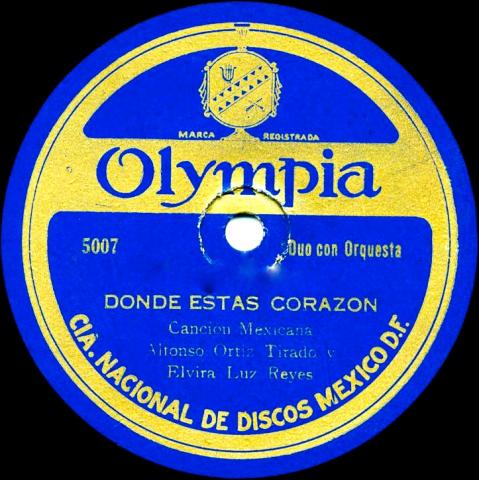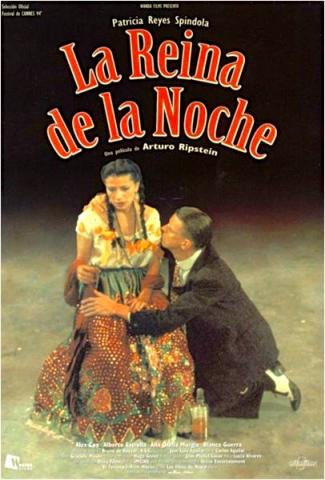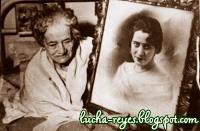the UCLA Chicano Studies Research Center,
the Arhoolie Foundation,
and the UCLA Digital Library
There are famous country singers, like Johnny Cash or Loretta Lynn, whose songs reflect the struggles and hardships they experienced in real life. More than celebrities, they become folk  heroes, because people sense authenticity in their artistry. The same is true for singer Lucha Reyes, a pioneer in Mexican ranchera music. Known for her bravado, her forceful voice and her hard-drinking ways, Reyes became a popular sensation in the 1930s as a solo singer, often backed by the legendary Mariachi Vargas de Tecalitlán.
heroes, because people sense authenticity in their artistry. The same is true for singer Lucha Reyes, a pioneer in Mexican ranchera music. Known for her bravado, her forceful voice and her hard-drinking ways, Reyes became a popular sensation in the 1930s as a solo singer, often backed by the legendary Mariachi Vargas de Tecalitlán.
And yet the Reyes legacy is not widely known, especially among younger music fans. Many would easily recognize her contemporaries: Jorge Negrete, Pedro Infante or Lola Beltran. But as OC Weekly editor Gustavo Arellano wrote, “only abuelitas and tías can fully appreciate – or even remember—Reyes.” (Arellano ranked Reyes No. 11 on his list, “The 20 Greatest Ranchera Singers of All Time.”)
 I must admit, I was among those who overlooked Reyes and her special role in the history of the music. Until, that is, I started researching her life and career for her biography, recently posted on this site. Soon, I was immersed in the tragedy of her life and the triumph of her art.
I must admit, I was among those who overlooked Reyes and her special role in the history of the music. Until, that is, I started researching her life and career for her biography, recently posted on this site. Soon, I was immersed in the tragedy of her life and the triumph of her art.
Reyes would have turned 100 this year. After her tragic suicide in 1944, her memory was overshadowed by stars who followed in her footsteps. She was marginalized, culturally and historically.
Subsequently, there have been efforts to restore Reyes to her proper place in the Mexican music pantheon. We have seen books, biographies, news articles, a full-length movie, a mini-documentary on Televisa and a docudrama on Mexican radio. For a good overview of these Reyes reassessment efforts, check out this essay by Sergio de la Mora, a Chicano studies professor at UC Davis.
 In Mexico, the Reyes revival has been spearheaded by avant-garde performer Astrid Hadad, both on record and on the stage. In 2012, the Mexico City daily Excelsior reported on an effort to restore the home and neighborhood where Reyes died – Andalucía No. 86 in the Colonia Álamos. And in Los Angeles, the public memory of Reyes has been kept alive almost singlehandedly by her biographer, Nazib Fauntel, who pushed to have a statue erected and a street named in her honor at Mariachi Plaza in Boyle Heights. In this YouTube video, you can see Fauntel addressing the audience at the dedication of Avenida Lucha Reyes, briefly explaining her importance to the music and the culture.
In Mexico, the Reyes revival has been spearheaded by avant-garde performer Astrid Hadad, both on record and on the stage. In 2012, the Mexico City daily Excelsior reported on an effort to restore the home and neighborhood where Reyes died – Andalucía No. 86 in the Colonia Álamos. And in Los Angeles, the public memory of Reyes has been kept alive almost singlehandedly by her biographer, Nazib Fauntel, who pushed to have a statue erected and a street named in her honor at Mariachi Plaza in Boyle Heights. In this YouTube video, you can see Fauntel addressing the audience at the dedication of Avenida Lucha Reyes, briefly explaining her importance to the music and the culture.
Some have come to see Reyes as a martyr in the fight against machismo.
“We are witnessing the recovery and rescue of mythic feminist figures, such as Frida, Nahui Ollin, María Antonieta Rivas Mercado, and most recently, Lucha Reyes,” composer and music critic José Antonio Alcaraz told Proceso, the Mexican magazine. “They are all part of the same spectrum, in which Lucha Reyes is the woman obstinately devoted to the struggle against the role assigned to her by society. It’s a struggle which she wins, but at the cost of her life.”
Read the full biography here.
– Agustín Gurza
2 Comments
Stay informed on our latest news!
Lucha Reyes
by JOYEL (not verified), 09/21/2019 - 08:51Indiscutiblemente, Luchas Reyes es la voz representativa folclórica mas significativa y con mas historia en la canción Ranchera Mexicana.
Existen unas grabaciones dificilísimas de conseguir, ademas que debe haber otras por ahí rodando que la compañía disquera para la que tenia un contrato de exclusividad RCA no las tiene.
Ejemplo:
"El Veneno"
"No Seas Malita"
"El Borracho"
"El Parrandero"
Lucha Reyes Biography
by EDGAR BENETT (not verified), 11/04/2016 - 12:00SENSACIONAL